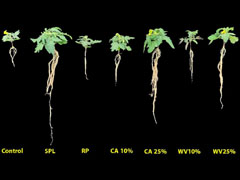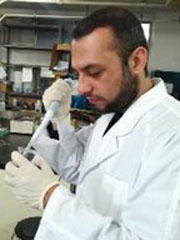Research work at a graduate school: New possibility of Agriculture utilizing natural resources
2021.01.20
All of the participants of "the Japanese Initiative for the future of Syrian Refugees" (JISR) have been proceeding with their research in their respective specialist fields at various universities in Japan. Among them, this program news features the research work of Mr. Saoud whose specialist field is agricultural engineering.
Mr. Saoud's research focused on fertilizer as a way of achieving the efficient productivity improvement of agricultural products. His work aims at contributing to the improved productivity of farmers while containing the production cost through the use of natural fertilizer as an alternative to expensive chemical fertilizer.
Mr. Saoud studied agricultural engineering at a university in Syria where undergraduate degree in agricultural studies with free tuition requires five years, the first two years of general education and the last three years of study in a specific field. He carried out soil analysis in various lands to investigate the characteristics of soil, and to analyze what kinds of crops and agricultural products were suitable for farmers. Taking a look at agricultural products in Syria, wheat and olives have an overwhelming share, but other various kinds of vegetables are grown as well. Syria is self-sufficient in most of the agricultural products and thus, it has a large proportion of farmers in the total population. In fact, Mr. Saoud has an uncle who grows olives and a cousin who teaches agricultural science at a university. His parents' home has an extensive kitchen garden. Growing up in such an environment, he naturally became familiar with nature as well as farming and his desire to develop Syrian agriculture steadily grew which made him decide to study agriculture at the university.
After graduation, he remained in Syria for some time but the worsening situation there made him decide to leave. He sought temporary asylum in Lebanon but could not find employment requiring his specialist knowledge of agriculture. While working to maintain a livelihood, he came to know the JISR program and decided to apply. To decide the contents of his research at a graduate school in Japan, he firstly studied the latest information on the agricultural sector using literature available on the Internet. He kept in mind that his research in Japan would contribute to the development of Syrian agriculture when he considered his research theme. This preparatory work led him to focus on rock phosphate, a natural resource found in abundance in Syria. While chemical fertilizer is often used for the cultivation of agricultural crops, its high cost poses a large burden on farmers. The use of chemical fertilizer also has a potentially negative impact on crops as well as the land depending on how it is used. To improve this situation, Mr. Saoud decided on the use of rock phosphate as an alternative to chemical fertilizer for his research theme and his application for the JISR program was accepted.
After post-arrival orientation for about one month, Mr. Saoud became a research student. During this period as a research student before enrolling in the master's program, each JISR participant can become accustomed to life in Japan and the learning environment of the graduate school to prepare for the master's program, and at the same time, learn Japanese language intensively. The six months period as a research student also helped him to improve his English. Speaking English as a common language was a major challenge for him as this was the first time to spend his student life in a non-Arabic country using English practically. He said he could establish the relationship with other students using English every day to communicate with them which naturally improved his English skills, while he studied Japanese for daily life communication as well.
After enrolling on a master's degree course, Mr. Saoud finalized his research theme with his supervisor and a tutor and developed a method for experimentation. He did experiments by using the result of the first experiment to develop a second new-designed experiment and repeat the process again and again for many experiments. The first step in his numerous experiments was to determine the properties of phosphate rock to confirm its usefulness as an alternative to chemical fertilizers. Using both rock phosphate and chemical fertilizer, he cultivated tomatoes at an experimental farm as a comparative study. In each cycle of experiment, he prepared some 70 pots and worked every day, checking the results approximately two months later. Repetition of this growth cycle found that root growth using only rock phosphate was significantly inferior to that using chemical fertilizer. This result indicated the possibility that rock phosphate increases the alkalinity of soil, adversely affecting root growth. To reduce the level of soil alkalinity, he added a tiny amount of acidic substances (citric acid and wood vinegar) to rock phosphate. Application of this mixture notably significantly boosted root growth although actual root growth still fell slightly short of that using chemical fertilizer. Mr. Saoud continued experimenting with different growth conditions to determine whether rock phosphate could be used as a fertilizer. The results of his experiments are shown in the photograph captioned "(1) Root growth of tomatoes under various conditions" where the state of root growth of seven individual plants is listed. The second from the left is a plant fed with chemical fertilizer (SPL). The third is fed with rock phosphate (RP). The fourth and fifth are fed with rock phosphate and different concentrations of citric acid (CA). The sixth and seventh are fed with rock phosphate and different concentrations of wood vinegar (WV). The first one on the left is a control specimen for which no fertilizer is used. The second specimen fed with chemical fertilizer shows best growth. The fifth and seventh fed with a high concentration of citric acid and wood vinegar respectively also show favourable growth even though it falls short of the second specimen. Mr. Saoud has successfully achieved these promising results within a limited period of two years.
The results at the experimental farm suggested the possibility of using rock phosphate as a fertilizer. However, Mr. Saoud said, further research on plant growth in an outdoor environment is necessary to make such results applicable to actual farming land. Once a positive result of using rock phosphate as a fertilizer has been evaluated and confirmed at actual farming land, the use of rock phosphate will likely increase with attentive explanation of the facts to farmers, resulting in the development of Syrian agriculture. Mr. Saoud strongly hopes to be involved in such development process in the future.
We hope that one day Mr. Saoud will have the opportunity to apply his study result and achievements in Japan to Syria.

Root growth of tomatoes under various conditions

Mr. Saoud working in the laboratory
scroll